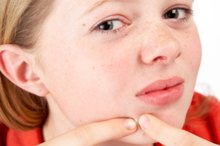How to Use Fucidin on Acne
Fucidin is a cream form of fusidic acid, an antimicrobial antibiotic that was first used as a topical drug in the 1940s, according to the Acne Guide 234. Originally, fucidin was used to treat all kinds of bacterial skin infections, burns and infections in wounds. The European Academy of Dermatology and Venerology reports that it has been discovered lately that fucidin is effective at treating acne and eczema as well 4. Fucidin works because acne forms when follicles are blocked and bacteria grow. The fusidic acid in fucidin penetrates the infected layer and kills bacteria, explains the Acne Guide.
Wash the infected area with a good water-based face wash. Be sure to dry the skin well. This is important to keep the bacteria from spreading to other areas, especially if your acne lesions are open 4.
Cream of Tartar Diet
Learn More
Apply a thin layer to the infected area after washing. Repeat the application three to four times a day, as directed by your doctor. Med Broadcast notes that your doctor may instruct you to apply the fucidin cream one to two times per day if she has directed you to cover the wound 2.
Repeat the procedure of washing, drying and then applying fucidin cream until the infected area clears up, or for up to 10 days, depending on your doctor's instructions 2.
Tips
Continue to use fucidin as long as your doctor instructs; the medication is like an oral antibiotic in that it can cause symptoms to clear faster than the causative infection. If you stop taking fucidin before the doctor instructed, your acne may recur.
Warnings
Med Broadcast notes to be sure to keep the medication away from your eyes.
Related Articles
References
Writer Bio
Based in Harker Heights, Texas, Timothy Onkst has been writing about sports, fitness and health since 2003. His articles have appeared in a variety of publications including "Texas Roundball" magazine, Yahoo Sports, Fox Sports and other websites.









